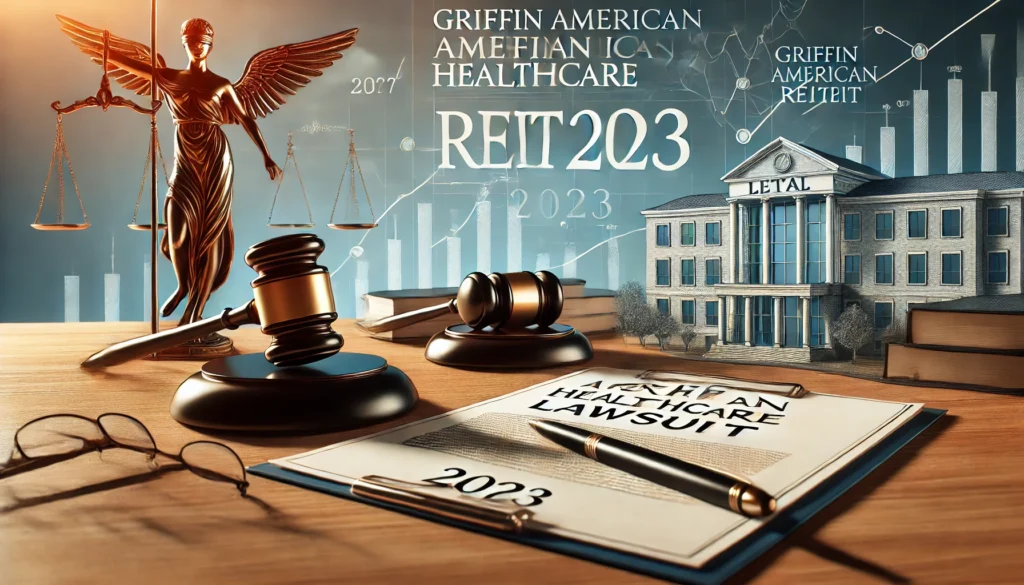Griffin American Healthcare REIT Lawsuit 2023: Causes and Impact

In 2023, the Griffin American Healthcare REIT lawsuit 2023, which focuses on real estate investments in the healthcare sector, became the center of a major controversy. This case drew attention from investors, legal experts, and financial regulators. The lawsuit revolved around allegations of financial mismanagement and lack of transparency, ultimately leading to significant losses for investors. In this article, we explore the events leading up to the lawsuit, the core allegations, the consequences for investors, and the broader implications for the industry.
Understanding the Griffin American Healthcare REIT Lawsuit 2023
The Griffin American Healthcare REIT lawsuit of 2023 highlights serious investor concerns about financial mismanagement and insufficient risk disclosure. This real estate investment trust, focused on healthcare-related properties, saw a sharp drop in its net asset value (NAV)—falling by 15.5% from $37.16 in 2021 to $31.40 in early 2023. Dividend payments were also reduced, causing significant financial strain for investors who relied on the REIT for steady income.
The lawsuit accuses financial advisors and brokers of failing to adequately inform clients about the risks involved, prioritizing commissions over investor interests. For many, this case serves as a reminder of the importance of due diligence and diversification when investing, especially in non-traded REITs that can carry hidden risks. The outcome may lead to stricter regulations and increased accountability in the financial industry to safeguard investor interests.
Background of Griffin American Healthcare REIT
Griffin American Healthcare REIT (formerly Griffin-American Healthcare REIT III and IV) was a real estate investment trust (REIT) that focused on healthcare-related properties, such as senior living facilities and medical office buildings. The REIT was marketed to investors as a stable and profitable option for generating passive income, especially attractive to retirees seeking steady returns.
Over time, the company merged with other similar REITs, rebranding as American Healthcare REIT. Its focus remained on generating returns through investments in healthcare real estate. However, despite its promises of growth and stability, the REIT faced significant financial struggles in 2023, which ultimately led to the lawsuit.
Key Events Leading to the Lawsuit
In 2023, the financial situation of Griffin American Healthcare REIT took a dramatic downturn. Investors noticed that the net asset value (NAV) per share, which was $37.16 in December 2021, had plummeted to just $31.40 by March 2023—a loss of 15.5%. This decrease in NAV reflected the falling value of the REIT’s assets and led to concerns about the stability of the investment.
Moreover, the company reduced its dividend payments, which were previously set at $0.40 per share, to $0.25 per share. This sharp reduction caused even more distress among investors, many of whom had relied on the REIT for a consistent income stream.
As these financial struggles became more apparent, investors began questioning the company’s management and the advice they had received from financial advisors who recommended the REIT as a stable investment. This dissatisfaction eventually escalated into a legal battle.
Core Allegations in the Lawsuit
The lawsuit against Griffin American Healthcare REIT centers around several key allegations:
Breach of Fiduciary Duty:
Investors have claimed that the financial advisors and brokerage firms who recommended Griffin American Healthcare REIT failed to disclose the full risks associated with the investment. The fiduciary duty of these advisors requires them to act in the best interests of their clients, and many investors believe that the advisors prioritized their own financial gain over their clients’ well-being.
Mismanagement and Poor Decision-Making:
Another significant allegation is that the REIT’s management made poor financial decisions that led to the company’s underperformance. Investors argue that the decline in NAV and the reduction in dividends were the results of mismanagement and a failure to properly navigate market conditions.
Regulatory Non-Compliance:
The lawsuit also touches on whether the advisors and brokers involved in promoting the REIT violated regulations that are designed to protect investors. Allegations of inadequate risk disclosure and failure to provide clear and honest investment advice have raised questions about the industry’s standards for investor protection.
Consequences for Investors
The financial impact on investors has been severe. The drop in the REIT’s NAV means that many investors have seen the value of their shares significantly diminish, while the reduction in dividend payouts has directly affected those who were relying on steady income from their investments.
Beyond the financial losses, many investors have reported feeling betrayed by the companies and advisors who had encouraged them to invest in the REIT. This has led to emotional distress, especially for individuals who were counting on the REIT to fund their retirement or other long-term goals.
Legal Developments and Investigations
In response to the growing dissatisfaction, several law firms launched investigations into the practices surrounding Griffin American Healthcare REIT. These investigations are looking into whether investors were misled or whether the financial advisors involved violated their legal responsibilities.
The legal action could result in a variety of outcomes, including settlements for affected investors, regulatory fines, and stricter rules for financial advisors recommending such investments. The lawsuit serves as an important reminder of the importance of accountability in the financial sector.
Implications for the Industry
The Griffin American Healthcare REIT lawsuit has broader implications for the investment and real estate industries:
Increased Regulatory Scrutiny:
The case has prompted calls for more oversight of non-traded REITs, which often promise high returns but come with significant risks. Financial regulators may introduce new regulations to ensure that such investments are more transparent and that risks are clearly communicated to investors.
Lessons for Financial Advisors:
The lawsuit underscores the need for financial advisors to prioritize their clients’ interests above all else. Advisors must fully disclose the risks involved in investments, especially when those investments involve complex or high-risk assets like non-traded REITs.
Impact on REITs:
The lawsuit has the potential to damage the reputation of healthcare-focused REITs, which are seen as a safe and profitable investment by many. The case could cause investors to reconsider such investments, especially in the healthcare sector, which can be volatile due to regulatory changes, economic shifts, and other external factors.
Investor Lessons from the Lawsuit
The Griffin American Healthcare REIT lawsuit serves as an important learning opportunity for both current and potential investors:
Importance of Due Diligence:
Investors must conduct thorough research before committing to any investment, especially in complex vehicles like REITs. Understanding the risks, as well as the potential for returns, is essential for making informed decisions.
Seeking Diverse Investments:
To avoid the risk of significant financial loss, investors should diversify their portfolios. Relying too heavily on one type of investment, such as a single REIT, can expose investors to unnecessary risks.
Selecting Reputable Advisors:
Working with trustworthy financial advisors who are transparent and have a track record of putting clients’ interests first is crucial. Investors should carefully assess their advisors’ qualifications and seek second opinions when necessary.
Current Status and Future Outlook
As of 2023, legal proceedings are still ongoing, and the full extent of the lawsuit’s impact is yet to be determined. However, the case has already led to greater awareness about the risks associated with non-traded REITs and could result in significant changes in how these financial products are marketed and sold.
There is also a possibility that the lawsuit will spark regulatory reforms aimed at improving investor protection. If successful, these changes could make future investments safer for individuals, particularly those relying on steady returns for retirement or other long-term financial goals.
Conclusion
The Griffin American Healthcare REIT lawsuit 2023 highlights the risks associated with real estate investments and the importance of transparency and accountability in the financial sector. For investors, it serves as a reminder to carefully consider the advice they receive and to fully understand the risks involved in any investment. As the legal proceedings continue, the outcome may reshape the future of real estate investments and investor protection in the U.S.
FAQs
What caused the Griffin American Healthcare REIT lawsuit in 2023?
The lawsuit stemmed from allegations of financial mismanagement, reduced returns, and insufficient risk disclosure by financial advisors recommending the REIT to investors.
How much did the value of Griffin American Healthcare REIT shares decline in 2023?
The net asset value (NAV) per share dropped by 15.5%, from $37.16 in 2021 to $31.40 by March 2023.
What are the main allegations against financial advisors in the lawsuit?
The primary allegations are that financial advisors breached their fiduciary duty by failing to disclose the risks of investing in Griffin American Healthcare REIT.
How did the lawsuit affect investors financially?
Investors faced significant losses due to the decline in asset value and reduced dividends, affecting both their income and capital returns.
What impact could the lawsuit have on the REIT industry?
The lawsuit may lead to stricter regulations for non-traded REITs and increased scrutiny of financial advisors to protect investors from misleading advice.
Recommended Article:
Michael Lang Schaumburg Lawyer: Mental Health Concerns After the 2024 Noise Dispute Incident
Mary Ruth Organics Lawsuit: Insights on Legal and Product Issues
Best Motorcycle Accident Lawyer PennBookCenter.com: Expert Tips and Advice

















































































































































































































































































































































































































































































































































































